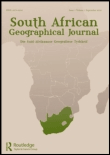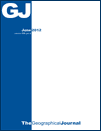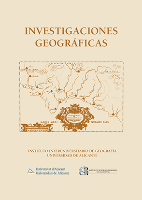
Fennia-International Journal of Geography
Scope & Guideline
Innovating research, fostering global geographical discourse.
Introduction
Aims and Scopes
- Cultural Geography and Identity:
The journal explores how cultural practices and identities shape and are shaped by geographical contexts, focusing on the intersections of ethnicity, gender, and belonging. - Environmental Change and Sustainability:
Research on environmental transformations, climate change, and sustainability practices is prominent, examining both local and global implications. - Urban Studies and Planning:
Fennia emphasizes urban landscapes, planning, and the socio-political dynamics of cities, particularly in relation to marginalization and community resilience. - Rural Development and Shrinkage:
The journal addresses rural issues, including depopulation, resource governance, and innovative approaches to rural development, reflecting on the challenges faced by declining regions. - Geopolitical Contexts and Migration:
It engages with themes of migration, asylum, and geopolitical crises, analyzing the spatial implications of these phenomena on communities and identities. - Participatory and Reflexive Methodologies:
Fennia encourages innovative and reflexive research methodologies that prioritize participatory approaches and community engagement in geographical studies.
Trending and Emerging
- Climate Justice and Activism:
Recent publications emphasize themes of climate justice, activism, and the role of grassroots movements, reflecting a growing concern for equitable environmental practices. - Spatialities of Belonging and Identity:
The exploration of how spatial contexts influence identities and belonging, particularly in relation to gender and ethnicity, is increasingly prominent in the journal's offerings. - Health and Well-being in Urban Environments:
Research highlighting the intersection of urban landscapes and health, particularly the therapeutic aspects of urban spaces, indicates a growing interest in public health within geographical studies. - Community Resilience and Adaptation:
There is an emerging focus on community resilience in the face of environmental and socio-political challenges, particularly in rural and marginalized areas. - Reflexivity and Methodological Innovation:
A trend towards reflexive research methodologies that challenge traditional academic norms is evident, with an emphasis on participatory approaches that prioritize community voices.
Declining or Waning
- Traditional Economic Geography:
There appears to be a waning interest in traditional economic geography topics, such as industrial location and regional economic analysis, as the journal shifts towards more culturally and socially oriented themes. - Historical Geography:
Historical analyses of geographical phenomena have decreased, indicating a potential shift away from retrospective studies towards contemporary issues and current events. - Purely Quantitative Methods:
The journal has seen a decline in the use of purely quantitative methodologies, favoring qualitative, participatory, and reflexive approaches that engage with lived experiences and narratives. - Geographical Information Systems (GIS) Applications:
There is a noticeable reduction in papers focused solely on GIS applications, suggesting a move towards integrating technology with socio-cultural and environmental narratives rather than technical analysis alone. - Conventional Land Use Studies:
Research focused on conventional land use planning and zoning issues has become less prevalent, as the journal increasingly prioritizes discussions around social justice and community engagement.
Similar Journals

Hrvatski Geografski Glasnik-Croatian Geographical Bulletin
Exploring the Depths of Geography Since 1929Hrvatski Geografski Glasnik-Croatian Geographical Bulletin, ISSN 1331-5854, E-ISSN 1848-6401, is an esteemed open-access journal published by the Croatian Geographical Society that has been serving the geography community since 1929. Based in Zagreb, Croatia, this journal focuses on a broad spectrum of geographical research, providing a platform for the dissemination of original articles, reviews, and case studies that contribute to the understanding of earth-surface processes and development planning. Although it currently holds Q4 rankings in both Earth-Surface Processes and Geography, Planning and Development, the journal is dedicated to enhancing its impact within the scientific community, aspiring to elevate research visibility and collaborative opportunities. With a commitment to open access, it ensures that all content is readily available to researchers, professionals, and students worldwide, fostering an inclusive environment for geographical scholarship. Engaging with this journal presents an opportunity to stay updated with emerging trends and pivotal studies within the discipline throughout its converged years from 1998 to 2024, making it a vital resource in geography and related fields.

TIJDSCHRIFT VOOR ECONOMISCHE EN SOCIALE GEOGRAFIE
Shaping Academic Discourse in Economics and GeographyTIJDSCHRIFT VOOR ECONOMISCHE EN SOCIALE GEOGRAFIE, an esteemed journal published by WILEY, provides a premier platform for the dissemination of cutting-edge research within the fields of economics and social geography. With an ISSN of 0040-747X and an E-ISSN of 1467-9663, this journal has established itself as a pivotal resource, exhibiting a remarkable Q1 ranking in both Economics and Econometrics as well as Geography, Planning and Development for 2023. Notably, it is positioned in the 95th percentile among 821 journals in its category of Social Sciences, and ranks 46th among 716 in Economics and Econometrics, underscoring its influential role in shaping academic discourse. The journal, which has been in publication since 1967 and is anticipated to run through 2024, invites contributions that explore the intricate interplay between economic phenomena and social geospatial dynamics. Researchers, professionals, and students are encouraged to engage with its findings, which are crucial for understanding contemporary socio-economic challenges and innovations on a global scale.

Quaestiones Geographicae
Connecting Researchers to the Heart of GeographyQuaestiones Geographicae, an esteemed open-access journal published by SCIENDO, serves as a vital platform for scholarly communication in the field of Earth and Planetary Sciences. Since its inception in 1979, the journal has been dedicated to promoting rigorous research and discourse in geography, encompassing a breadth of topics that reflect the dynamic nature of the discipline. With an impressive Impact Factor belonging to the Q3 quartile category, the journal actively contributes to the global scientific community's understanding of geographical phenomena. Its commitment to open-access publishing since 2010 ensures that groundbreaking research is accessible to a wider audience, facilitating collaboration and innovation. As part of its enduring legacy, Quaestiones Geographicae engages researchers, professionals, and students alike, inviting them to explore, share, and expand the boundaries of geographical knowledge.

South African Geographical Journal
Elevating discourse in geography, planning, and development.The South African Geographical Journal, published by Routledge Journals, Taylor & Francis Ltd, is a leading scholarly platform dedicated to advancing research in the fields of geography, planning, and development. With an impressive history spanning from 1931 to 2024, this journal not only retains its relevance in the academic community but also proudly holds a Q2 rank in both Earth and Planetary Sciences and Geography, Planning and Development, marking it as a significant contributor to the scholarly discourse. The journal is ranked in the top 32% of its category within Scopus, affirming its stature among researchers and professionals. Although it currently does not offer Open Access, the journal provides a critical forum for the exchange of ideas, methodologies, and findings, encouraging dialogue that informs policy and practice in the geographical sciences. Readers can expect a rich variety of articles that encompass both theoretical and practical aspects of geography, making it essential for academics and practitioners alike.

GEOGRAPHICAL JOURNAL
Connecting theory and application in the realm of geography.Geographical Journal, published by Wiley, is a leading scholarly resource dedicated to advancing the field of geography and earth-surface processes. With an established history dating back to 1973, this prestigious journal thrives on disseminating high-quality research, featuring a robust archive that encompasses critical insights from various geographical and environmental studies. As evidenced by its impressive Q1 rankings in both Earth-Surface Processes and Geography, Planning and Development, the journal stands out in its commitment to impact and relevance in the academic community. Although not Open Access, the journal provides researchers, professionals, and students with invaluable peer-reviewed articles essential for understanding complex geographical phenomena. Whether you are focused on socio-environmental interactions or earth sustainability, Geographical Journal serves as a cornerstone for innovative research, fostering knowledge that shapes policy and practice.

Annals of the American Association of Geographers
Unveiling the Complexities of Our Planet through ResearchAnnals of the American Association of Geographers is a leading academic journal published by Routledge Journals, Taylor & Francis Ltd, and is based in the United Kingdom. With an impact factor positioning it in the Q1 category for both Earth-Surface Processes and Geography, Planning and Development, it stands as a pivotal resource for researchers and professionals in the fields of geography and environmental sciences. The journal’s broad scope accommodates a diverse range of topics, including spatial analysis, environmental change, and human geography, reflecting the dynamic nature of geographical research. Accessible in both print and digital formats, the journal encourages open dialogue and dissemination of knowledge among its authors, readers, and the academic community. As it converges through the years from 2016 to 2024, the Annals continues to showcase high-quality research that influences geographic thought and practice, making it essential reading for students, academics, and practitioners alike.

Revista Geografica Venezolana
Navigating the Complexities of Geography and PlanningRevista Geografica Venezolana is a prominent academic journal published by the Instituto de Geografía y Conservación de Recursos Naturales, Universidad de los Andes, Venezuela. With ISSN 1012-1617 and E-ISSN 2244-8853, it has been a vital platform for scholarly discourse since its inception in 1981, addressing essential topics within the fields of Earth-Surface Processes and Geography, Planning, and Development. Despite its current categorization in Q4 quartiles and lower rankings in Scopus, the journal serves as an important resource for researchers and practitioners, offering insights that contribute to the understanding of geographical and environmental challenges in Latin America and beyond. The journal aspires to foster interdisciplinary dialogue and promote research that tackles pressing societal issues through geographical perspectives. Readers are encouraged to explore its rich content and engage with contemporary research methodologies and findings in the geographical sciences, making it a critical reference for students, researchers, and professionals in the field.

Anales de Geografia de la Universidad Complutense
Advancing Geographical Insights for a Sustainable FutureAnales de Geografia de la Universidad Complutense is a prominent journal in the fields of Geography and Urban Studies, published by Universidad Complutense de Madrid. With a rich academic tradition since its inception, this journal has been open access since 1981, ensuring that valuable research is readily available to scholars and practitioners alike. The journal holds a significant position within the academic community, reflected in its Q3 ranking in both Geography, Planning and Development and Urban Studies categories as of 2023, and it provides an essential platform for interdisciplinary research and dialogues on pressing geographical and urban issues. As part of the Scopus indexed database, it ranks #201 out of 279 in Urban Studies and #684 out of 821 in Geography, indicating its growing influence and relevance. Based in Madrid, Spain, the journal welcomes contributions that aim to advance knowledge, foster collaboration, and stimulate critical thinking in these dynamic fields.

GEOGRAFICKY CASOPIS-Geographical Journal
Advancing geographical insights for a sustainable future.GEOGRAFICKY CASOPIS-Geographical Journal is a prestigious publication dedicated to advancing knowledge in the fields of geography and earth sciences, published by the SLOVAK ACADEMY OF SCIENCES, INSTITUTE OF GEOGRAPHY. With a rich history dating back to its inception in 1976, the journal serves as a vital forum for researchers and professionals to disseminate their findings across a range of topics including earth-surface processes, geography, planning, development, and geology. Notably, it maintains a respectable Q3 category ranking across these disciplines as of 2023, indicating its contribution to relevant academic discourse. The journal is indexed under critical databases and engages a global audience, making it an essential resource for scholars seeking to stay informed about contemporary issues and advancements in geography. Although currently not an open-access journal, it emphasizes the sharing of significant research findings and encourages submissions from various geographical contexts to enrich the scientific community. Geographical Journal's commitment to fostering interdisciplinary dialogue ensures its relevance and importance in shaping the future of geographical research.

Investigaciones Geograficas-Spain
Advancing geographical knowledge for a sustainable future.Investigaciones Geográficas-Spain is an esteemed academic journal published by the Universidad de Alicante, dedicated to advancing the fields of geography, planning, and development as well as earth and planetary sciences. With its commitment to open access since 1983, the journal ensures that research is readily available to a global audience, facilitating knowledge dissemination and collaborative discourse. As reflected in its 2023 Scopus rankings, it holds a commendable position within the Q3 category in both Earth and Planetary Sciences and Geography, Planning and Development, making it a noteworthy resource for scholars and practitioners in these disciplines. The journal's scope encompasses diverse geographical research, aiming to address pressing environmental and societal challenges through empirical studies and theoretical advancements. By contributing to the knowledge reservoir from Spain and beyond, Investigaciones Geográficas-Spain serves as a vital platform for researchers, professionals, and students seeking to enrich their understanding of geographical phenomena.